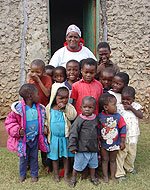Ticklish - A patient encounter
 (Swazi grandmother with children.)
(Swazi grandmother with children.)Children are ticklish, even those close to death. Benele certainly was.
He walked in the room with his grandmother. He peered at me in manner that I have become accustomed to since arriving in Swaziland. It was not the look of fear or anxiety that pediatricians typically inspire. It was that of a child trying to hide the amusement inspired by having such a strange-looking doctor.
The grandmother’s eyes communicated something different. In her gaze was that uneasiness that one feels when one does not know what to make of a strange-looking doctor. Noticing this, I put down Benele’s chart and explained to her that I had traveled from the United States to help take care of children such as Benele because I want him to grow up and grow strong. She answered me with the same, skeptical look.
If HIV is pulling Swaziland apart, then Swazi grandmothers are one of society’s most sticky glues. When mothers get sick or die, the children go to the grandmother (called “gogo” in SiSwati). A gogo can in this way accumulate over a dozen dependents. These women are a reservoir of wisdom, dedication, and surrogate motherhood in this kingdom’s troubled times.
If a Swazi household is being held together in a country where over 40% are HIV infected, it is because of the gogo. This child was alive because of the efforts of this gogo. Benele’s chart told the story of a dying, orphaned child with but one advocate. I wanted to join forces, but I was going nowhere if she did not trust me.
I asked the gogo what her name was. She told me (it was long and difficult to pronounce) and I repeated it back to her. She smiled and looked at the ground and then at the translator whom she did not need as her English was excellent. I said that I was sorry that I could not say it well but that I was studying her language and that next time I met her I would say her name well and then greet her, for I knew too little SiSwati to do either at that moment.
She smiled, paused, and said, “With pronunciation like that, you will be speaking SiSwati very soon.” I thanked her for the compliment, and she smiled, her eyes meeting mine and staying there. After a few seconds, she said something to the interpreter and they both laughed. She said, in perfect English, that she was happy that I was coming here to see Benele and learn SiSwati. A partnership was kindled, and I turned toward my 8 year-old patient, who needed both of us badly.
For nearly nine years, Benele’s body had been fighting HIV. The disease increases caloric expenditure and nausea and decreases energy and appetite, so it was no surprise that his body weighed just over 30 lbs. After shaking the child’s diminutive hand, I leafed through his chart. He was started on ARVs at the government hospital well over a year ago, but his CD4 count never improved. He had not gained weight for nearly a year. Each page of his thick medical chart was riddled with the names of opportunistic infections. In more recent visits, one could find words like “possible resistance” and “despite first-line therapy”.
Benele’s medicines were not working, and this is uncommon in a child receiving appropriate first-line antiretroviral. There are many potential reasons for Benele’s predicament. HIV, despite being infinitesimally small, is very clever. It is constantly reinventing itself, forever learning. HIV inherently replicates itself with a high error rate, amassing offspring with millions of mutations. Those whose mutations allow them to survive whatever the human body or medical science throws at them pass that mutation on. This process usually takes many years. But, if HIV gets lucky, or a patient misses multiple doses, it can occur rapidly.
In other words, HIV makes Darwinism look easy. For this reason, it is one of humankind’s most venerable modern enemies. For this reason, Benele’s HIV had found a way to survive the highly active antiretroviral therapy that he had been on for nearly two years, and AIDS was in the process of killing him.
Benele’s arms were like broom handles, his abdomen like an overfilled duffle bag, his large spleen and liver accentuating his frail limbs. As my eyes were examining Benele’s tiny, distorted body, his eyes were examining me. He seemed to have a minor scabies infection, but it was difficult to be certain as his body is not able to mount a normal immune response to the invading mite. I pulled out my stethoscope. He was still gazing at me. His pneumonia, diagnosed at his previous visit, was getting better on his current antibiotics, it seemed. His lungs still sounded horrible, but he was breathing with less effort, a practical and reassuring improvement. I looked into his eyes and placed my hands below my own chin show him that I was going to do the same to him. Children with HIV/AIDS have very abnormal lymph nodes, and this is a common place to feel for them. After my gesture, he lifted is chin, and I reach for him.
I do not know how a child can laugh so loud with such a broken body.
How do his eyes still shine so?
How did I get to be so lucky to have the privilege of being in the same room with this sick, beautiful, ticklish boy?
I charted my exam findings and sent Benele to the pharmacy to retrieve his second-line HIV therapy, the medicines that I hope would reduce his viral load, increase his CD4 count, and renew his body’s innate ability to fight infection. The new drugs are designed to attack Benele’s HIV by a different mechanism than the initial regimen, and his chances of improvement are good.
“Siyabonga”, gogo said as she left the exam room. This was a word I knew. It meant “thank you”. I wanted to stop her and tell her how much I admired her. I wanted to explain that helping her ticklish grandson live to grow up to be a strong man made me feel proud and alive. I wanted to tell her that hearing him laugh filled my heart.
Instead, I said “You’re welcome,” for I could not find the words, and the waiting room was full.
Labels: Patient encounters


1 Comments:
Thank you for your brilliant blog! Your writing is amazing and you pretty much leave me teary eyed in every entry (although it is easy to do to a big softie)
Thank you mostly for bringing your skills and help to a country I so deeply love.
Post a Comment
<< Home